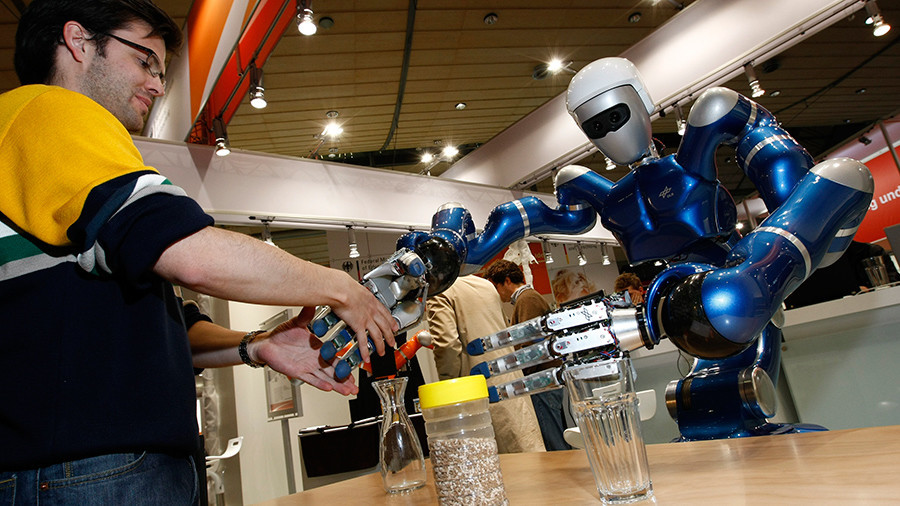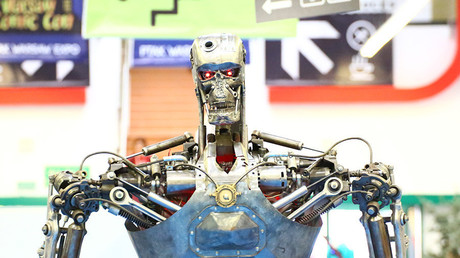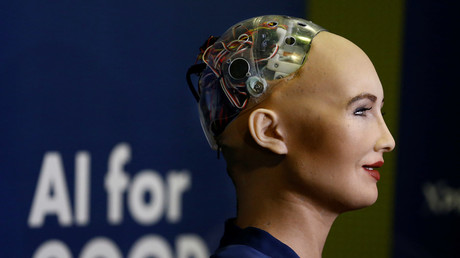Het is als met de invoering van betaalautomaten, deze werden NB gepropageerd door de loketmedewerkers van de banken (uiteraard onder dwang..). Deze automaten hebben duizenden banen overbodig gemaakt en daarvoor zijn amper banen teruggekomen........ Hetzelfde geldt voor de landbouw, daar zijn door automatisering nog amper extra krachten nodig.
Ook in het volgende RT artikel (via Anti-Media) wordt nog wel gesproken over extra banen door automatisering. Jammer dat er geen aandacht wordt besteed aan het feit dat veel banen die zullen verdwijnen worden vervuld door mensen die op z'n zachtst gezegd niet goed kunnen leren, terwijl men spreekt over vervangende banen waarvoor je toch echt behoorlijk moet kunnen leren......
Uiteindelijk zal er een enorm leger ontstaan van mensen die niet meer aan de bak komen. Wie gaat dat betalen? Juist, jij en ik! Terwijl in feite de grote bedrijven en daarmee hun aandeelhouders fiks zouden moeten investeren in het onderhoud van dat leger werklozen en hen nog enigszins zinvolle functies te kunnen geven in de maatschappij...... Immers deze bedrijven en aandeelhouders genereren straks enorme kapitalen met de voortschrijdende automatisering...... Tegelijkertijd betalen bedrijven steeds minder belasting, neem de voornemens van het inhumane kabinet Rutte 3 om Nederland nog verder uit te bouwen tot belastingparadijs met afschaffing van de dividendbelasting voor buitenlandse aandeelhouders......
The robots are coming! Technology could replace up to 800mn jobs by 2030, study says

Published
time: 29 Nov, 2017 15:18
All
the effort you put into studying at university may not have been
enough – because robots could be coming for your job. A new study
found that as many as 800 million workers could be replaced by
technology by 2030.
The study from
the McKinsey Global Institute, the research arm of the economic think
tank McKinsey & Company, estimates that "between
400 million and 800 million individuals could be displaced by
automation and need to find new jobs by 2030 around the world." It
estimates that between zero and 30 percent of the hours currently
worked globally could be automated by that time.
Those
most affected will be people who work in "predictable
environments" doing
tasks such as operating machinery and preparing fast food. Those who
make a living collecting and processing data also face a high risk of
being rendered redundant by technology.
People
who work in less predictable environments such as gardeners,
plumbers, and childcare staff face a smaller risk, because their
roles are "technically
difficult to automate and often command relatively lower wages, which
makes automation a less attractive business proposition."
However,
it's not all doom and gloom for the future of employment. The study
noted that automation sometimes allows workers to remain employed in
a different capacity. "Even
when some tasks are automated, employment in those occupations may
not decline but rather workers may perform new tasks," McKinsey
& Company wrote in a release on its website.
However,
workers may need to "shift
occupational categories" and "learn
new skills" in
order to participate in any new jobs. "Of
the total [400 million to 800 million] displaced, 75 million to 375
million may need to switch occupational categories and learn new
skills," the release
states.
It
noted that China has the largest number of employees who would need
to switch occupations, up to 100 million if automation is adopted
rapidly, or 12 percent of the 2030 workforce. The numbers are higher
in more advanced economies, with up to one-third of the 2030
workforce in the US and Germany needing to switch occupations, along
with nearly half of Japan. Countries which fail to prepare workers to
transition to new jobs will feel the impact through a rise in
unemployment and depressed wages, according to the study.
The
study acknowledges a growing concern that there will not be enough
jobs for workers due to automation.
However, it notes that those fears may be "unfounded," citing historical trends. "Over time, labor markets adjust to changes in demand for workers from technological disruptions, although at times with depressed real wages." It goes on to conclude that adequate job creation can take place to offset automation "with significant economic growth, innovation, and investment."
Established
in 1990, the McKinsey Global Institute (MGI) examines industry
trends "to
better understand the broad macroeconomic forces affecting business
strategy and public policy,"according
to its website. It aims to provide industry leaders with facts and
insight on which they can base management and policy decisions.
Read
more


